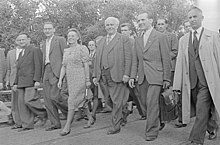Erich Glückauf
Erich Glückauf (born September 12, 1903 in Wittlich , † April 23, 1977 in Berlin ) was a German SED functionary.

Erich Glückauf was the son of a book printer. After attending elementary and secondary school, he worked as a mountain, country and Construction worker active. In 1920 Erich Glückauf joined the Communist Youth Association and fought in the so-called Red Ruhr Army against the Freikorps and the Reichswehr of the Weimar Republic.
In the KPD, which he joined in 1922, Erich Glückauf worked as a functionary and editor in East Westphalia and the Lower Rhine. From 1936 to 1939 he took part in an international brigade in the Spanish Civil War and was editor of the German freedom broadcaster 29.8 . He then went to Amsterdam, where he was imprisoned. After his detention he was deported to Belgium. He was then able to emigrate to Sweden via Norway, where he was interned until 1943. In 1943 he became editor-in-chief of the German-language anti-fascist magazine "Politische Information".
After the end of the war he returned to Germany and became a member of the SED. In 1946 he became editor-in-chief of the SED newspaper Landes-Zeitung in Schwerin. From 1946 to 1949 he was a member of the Mecklenburg State Parliament , of which he was a member of the Presidium. Until 1950 he was a member of the SED state leadership in Mecklenburg. From 1961 to 1968 he was a member of the SED's "envoy" to the Politburo of the KPD, which was operating illegally in the Federal Republic of Germany, in East Berlin. From 1974 to 1977 he was a research assistant at the Institute for Marxism-Leninism at the Central Committee of the SED .
In 1970 he received the Karl Marx Order . On the occasion of his 70th birthday, he was awarded the Patriotic Order of Merit in gold. On his 80th birthday in 1983, a street in the East Berlin district of Marzahn was named after Erich Glückauf. After the turn of the peaceful revolution that was Erich Glückauf Street in 1992 in honor of the East German dissident Robert Havemann in Havemannstraße renamed.
His urn was in the grave conditioning Pergolenweg the memorial of the socialists at the Berlin Central Cemetery Friedrichsfelde buried.
literature
- Hermann Weber , Andreas Herbst : German communists. Biographisches Handbuch 1918 to 1945. Dietz, Berlin 2004, ISBN 3-320-02044-7 , pp. 250-251.
- Gottfried Hamacher. With the assistance of André Lohmar: Against Hitler - Germans in the Resistance, in the armed forces of the anti-Hitler coalition and the "Free Germany" movement: short biographies . Rosa Luxemburg Foundation, Berlin. Volume 53. ISBN 3-320-02941-X ( PDF )
- Michael F. Scholz: Erich Glückauf . In: Who was who in the GDR? 5th edition. Volume 1. Ch. Links, Berlin 2010, ISBN 978-3-86153-561-4 .
Web links
Individual evidence
- ^ New Germany , October 7, 1970, p. 5
- ^ Congratulations from the Central Committee to Comrade Erich Glückauf , In: Neues Deutschland, September 12, 1973, p. 2
| personal data | |
|---|---|
| SURNAME | Glückauf, Erich |
| BRIEF DESCRIPTION | German SED functionary, MdV |
| DATE OF BIRTH | September 12, 1903 |
| PLACE OF BIRTH | Wittlich |
| DATE OF DEATH | April 23, 1977 |
| Place of death | Berlin |
